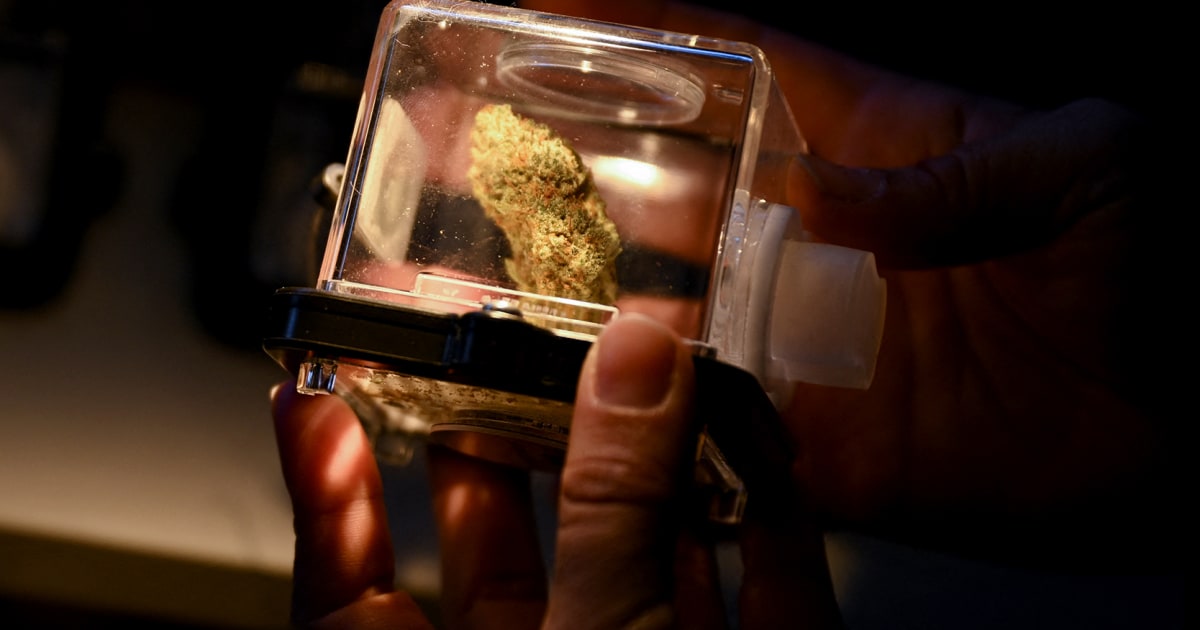By Akshay Syal, MD - NBC News
Over the past decade of diagnosing countless young patients with new psychotic disorders, Dr. Ryan Sultan, a New York psychiatrist, has highlighted a surprising result. "Of all the people I've diagnosed with a psychotic disorder," he says, "I can't think of a single person who didn't also test positive for cannabis."
Sultan, an assistant professor of clinical psychiatry at Columbia Irving Medical Center, is one of many experts raising serious concerns about rising marijuana use among teens and young adults. And there is growing evidence of the association between this substance and psychiatric disorders such as depression, bipolar disorder and schizophrenia, especially in young men.
[More Fentanyl-Tainted Marijuana in U.S.: Authorities Warn of Increase]
New research published this month, involving millions of people around the world for decades, adds to concerns that excessive use of high-potency cannabis and the legalization of recreational weed in many states across the country could exacerbate the mental health crisis that exists among young adults.
"There's a great sense of urgency, not just because more and more people are smoking marijuana, but because more and more people are using it in harmful ways, with an increasing concentration of THC [tetrahydrocannabinol]," Dr. Nora Volkow, director of the National Institute on Drug Abuse, said in an interview.
One of the studies, conducted by researchers in Denmark in collaboration with the National Institutes of Health (NIH), found evidence of a link between cannabis use disorder and schizophrenia. The discovery was most striking in young men between the ages of 21 and 30, but was also seen in women of the same age.
A person looks at a cannabis flower at a legal retail location in Los Angeles, California. PATRICK T. FALLON / AFP via Getty Images
The study, published in the journal Psychological Medicine, analyzed data from nearly 7 million men and women in Denmark over several decades to analyze the relationship between schizophrenia and cannabis use disorder.
The magnitude of the connection between the two in the case of young men surprised the study's author, Volkow, who expected the figure to be closer to 10%. "It's worrying," he said.
There are currently 22 states that allow recreational marijuana use, and Minnesota is likely to be the next to legalize it.
Whether laws regulating recreational cannabis contribute to underage use is unknown, but Volkow has made teen cannabis use a top priority for NIDA.
Daily marijuana use among young adults has reached unprecedented levels: more than one in ten young people between the ages of 19 and 30 report using it daily and almost half report having used it in the last year, according to the agency's most recent data.
Another study, led by Sultan and Columbia researchers and published earlier this month, determined that teens who only use cannabis recreationally are two to four times more likely to develop psychiatric disorders, such as depression and suicide, than teens who don't use cannabis at all.
Several Young California Students Get Poisoned by Marijuana Gummies
Feb. 7, 202301:46
Since studies to date have been observational and do not directly prove cause-and-effect, the connection between marijuana and psychiatric disorders is controversial. It is unclear whether people who already suffer from or are developing psychiatric disorders are more likely to turn to cannabis as a way to self-medicate or whether cannabis use triggers mental problems.
Volkow is optimistic that a large, ongoing study of adolescent brain development at NIH can help answer this question.
Sultan acknowledged the limitations of the tests. "It's a kind of circular feedback where they feed off each other," he said.
[Number of Kids Getting Sick from Ingesting Edible Marijuana on the Rise, Study Warns]
Dr. Deepak D'Souza, a psychiatrist at Yale University who has studied cannabis for 20 years, insists there are too many lines of evidence to ignore. "We may be grossly underestimating the potential risks associated with cannabis," he said.
Given the increasing legalization and increasing potency of cannabis products, D'Souza has never been more concerned about the mental health effects of cannabis use among young people.
"This is a big concern," he said. "We have been woefully inept at educating the public and influencing policy."
Is legalization affecting marijuana use rates?
According to an analysis published earlier this month in the journal Substance Abuse, early data suggests that, among young adults ages 18 to 25, legalization is driving up rates of cannabis use, particularly in Oregon and Washington.
The research, led by researchers at Canada's McMaster University, found that testing in other age groups is slightly less clear, and more research is needed to understand how legalization is affecting rates of cannabis use.
In areas where marijuana is legalized and more easily accessible, Volkow's concern is the ease with which the products can be mixed, which would lead to consuming a high total dose of marijuana.
FDA studies whether cannabis is safe in foods and other plant-derived supplements
Dec. 28, 202200:24
One of the biggest problems, he says, is the lack of regulation on THC concentration in products.
Marijuana consumed decades ago had THC concentrations, the main psychoactive ingredient, of 2 to 3%, but current cannabis products can have THC levels of up to 90%.
"It's not even the case with alcohol, as you can't put more than a certain percentage of alcohol in liquors," he said. "The same goes for tobacco cigarettes, you regulate how much nicotine they have. There is no regulation here."
The potency of THC is important, Volkow said, because cannabis is more likely to be linked to psychosis if higher doses are consumed.
At what age are you most vulnerable?
Research has shown that the human brain is the last organ to fully develop and does not end until the mid to late twenties. That makes teens and young adults especially vulnerable to the effects of cannabis, as their brains continue to mature.
"Really, the ideal time to consider using weed — if you're going to use it at all — is at age 26 or later," Sultan said.
People who wait until at least age 26 are much less likely to become addicted or develop mental disorders, said Dr. Sharon Levy, a pediatrician and addiction specialist at Boston Children's Hospital. The greatest risks are clearly found in adolescence and youth," he said.
However, people with a family history of psychotic disorders should not use cannabis, Sultan said.
What effects does cannabis have on the brain?
Although scientists are still learning about marijuana's effects on developing brains, studies so far suggest that teen marijuana use can affect functions such as attention, memory and learning, multiple studies have found.
"It somehow interferes with the connections we use in our brain to distinguish between what's going on in our head and what's going on outside of it," Levy explained, referring to the psychotic symptoms that can appear.
Cases of Children Accidentally Using Marijuana Candy Increase
April 21, 202202:02
D'Souza added that cannabis use can have serious repercussions on the developing brain due to its effects on the endocannabinoid system, a complex brain signaling system that marijuana targets.
"Endocannabinoid systems play an important role in brain sculpting during adolescence, which is when schizophrenia usually manifests," he said.
Disrupting that system with cannabis use could have "complex far-reaching implications on brain development."











/cloudfront-eu-central-1.images.arcpublishing.com/prisa/KMEYMJKESBAZBE4MRBAM4TGHIQ.jpg)


